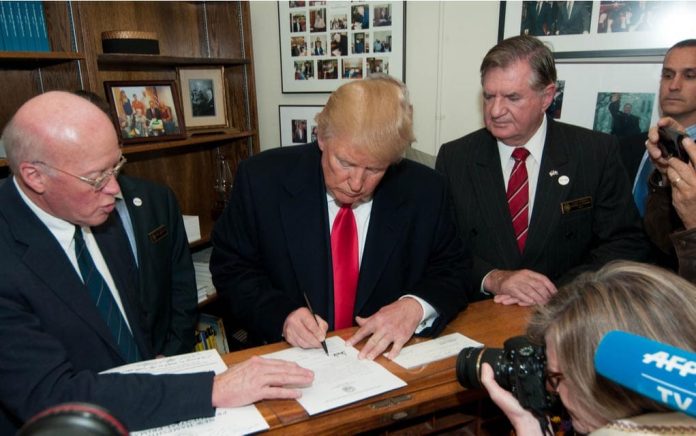
(RepublicanReport.com) – Although President Donald Trump issues considerably fewer executive orders than many of his predecessors, many of those he has signed have been big news. In fact Trump has issued fewer than 200 executive orders so far, while Woodrow Wilson (D) signed 1,803 and Franklin Delano Roosevelt (D) enacted a staggering 3,522. Shockingly, only one US president – William Henry Harrison – hasn’t used them.
However, when we think of the government taking action, it’s typically through passing legislation. So, what’s the difference between executive orders and laws?
The Difference
Laws start off as a bill in either chamber of Congress and have to be passed by a majority in both parts. The president can veto an approved bill, but Congress can override that veto with a two-thirds vote in both chambers. The principle is that laws are passed by the American people’s elected representatives. So, in a way, this is how citizens have democratic consent.
Executive orders are different. The president has the power to simply write and sign an executive order without the need for any votes in Congress. Once signed, the order has the force of law.
Checks and Balances
This is obviously a very powerful tool, so there are limits on how it can be utilized.
The Constitution doesn’t specifically authorize executive orders, but it does state that executive power is held by the president, and executive orders have become accepted as the way the president exercises this power. Additionally, the Supreme Court has ruled that all executive orders have to be supported by the Constitution. This can either be through a clause in the Constitution that gives the president a power or by Congress delegating a power to the executive branch.
Executive orders can be overruled; they’re subject to judicial review and can be voided if the Supreme Court decides they’re unconstitutional. Congress can refuse to allocate funds for any order that requires spending, and orders can also be voided if Congress passes a law that overrules them – although this usually needs a veto-proof majority.
Finally, a president can cancel any executive order written by themself or any previous president, Usually, a new president will review existing executive orders early in their first term and cancel any they disagree with.
Laws passed by Congress have more democratic legitimacy than executive orders, but there’s a place for both. An executive order gives the president a way to take action when it’s urgent, and there are plenty of checks and balances built in to make sure the system isn’t abused.
Copyright 2020, RepublicanReport.com










